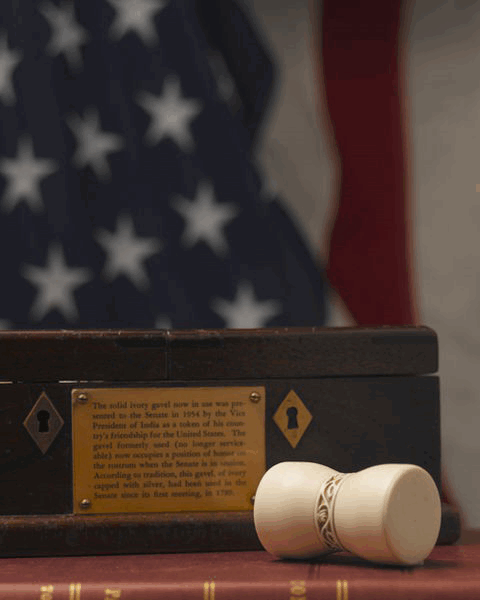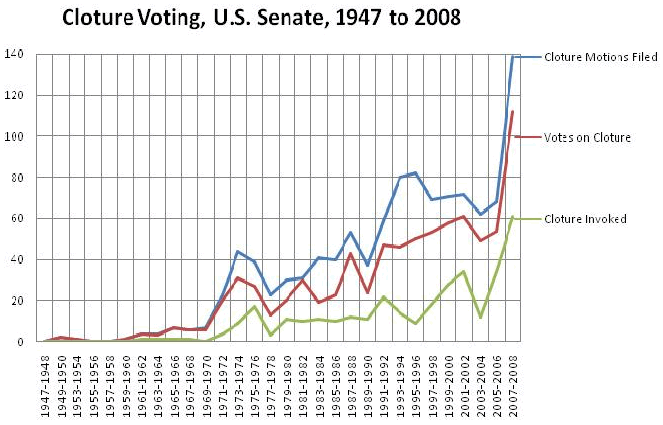Excerpt 1

used by the presiding officer;
credit: U.S. Senate Historical Office
"Some of you may remember that I was involved in several long and sometimes bitter debates over the cloture rule. When I traveled around the world, I always asked parliamentary leaders how their rules governed the closing of debate: How did their Parliament get to a vote? Wherever I went, I got the same response: Bafflement. They could not understand it. They could not explain how they got to a vote. Somehow, they just called a vote and it was held.
Of course, that is much different than here in the Senate. One of the first things we learn in the Senate is the rules that govern the closure of debate. It is the essence of the stature and the power of each Senator and, I believe, of the Senate itself.
When I came to the Senate, I thought a simple majority should be enough to end debate. I had seen the cloture rule abused in the past, especially on civil rights. The old rules permitted virtually endless talk. In recent years, many Senators had developed a post-cloture strategy where, even after a successful cloture vote, they could still carry on forever, reading and amending the Journal, reading and amending the Chaplain's prayer — as we did for several days — filing hundreds of amendments, with no end in sight.
It had to be changed, and it was, to what is now called the Byrd rule. But to end a filibuster still requires 60 votes, and I believe that is about right. It is a balancing act. You need to be able to close off debate, but you also need to give an individual Senator the power to stop everything in the country and to rip open an issue in a way that no other institution in America can."
Senate Leaders Lecture Series, September 4, 2002.
Excerpt 2
"The attack on the filibuster is developing into a ritual for the beginning of every Congress—a ritual led by the same group of Senators who make the same eminently logical arguments, only to be defeated and forced to await the beginning of still another Congress.
I would hope that we could once and for all put an end to this principle of minority control and get on to the urgent business of the day. For I have the unpleasant feeling that time is not on our side and that we cannot indefinitely afford to be bound by a rule which fosters obstructionism." 91st Cong., 1st sess., Congressional Record 115 (January 14, 1969) at 585.
Excerpt 3

"Since coming to the Senate, I have viewed a change in Rule XXII as one of the most crucial issues of congressional reform. Basically it has been my position, and continues to be, that Rule XXII's provision that two-thirds of those present and voting are required to vote cloture permits paralysis of the legislative process. Thus, I have consistently supported past efforts to amend Rule XXII. This is still my position, and I will continue to support efforts to change Rule XXII....
As I see it, it is an issue between the ability to paralyze, on the one hand, and the ability to require full ventilation of an issue, on the other. In my opinion, there are crucial issues which demand full consideration by the Senate—the kind of full consideration that no other institution in this country is capable of giving. Such consideration requires extended debate." 92nd Cong., 1st sess., Congressional Record 117 (September 29, 1971) at 33890.
Excerpt 4

"Senate Resolution 4 clearly assures that the Senate will continue guaranteed lengthy, respectful debate and deliberation on all matters coming before it. If one looks at the roster of the Senate on practically any issue, and asks what is required to achieve cloture, it is clear that one would be required to have broad agreement and consensus before cloture can be invoked.
Unlike the present rule where, if there are absentees on the negative side of a cloture motion, those absentees reduce the burden of the proponents of cloture, 60 would be required. We would need 60 on the side of the proponents to close off debate. It is a very high, but fair, hill to climb. The burden would be on the proponents of cloture.
In order to get 60 votes, the proponents would have to have the support of a broad cross-section of geographic and political points of view. It is a proposal which strongly protects those who want debate and restraint, and it would continue to assure that the Senate is a fair body, a body which represents all points of view, and one which can move in the face of strong opposition only when a respectable, decent consensus has been reached with 60 Senators." 94th Cong., 1st sess., Congressional Record 121 (March 6, 1975) at 5527.
Excerpt 5

"Today is an historic day in the U.S. Senate. Passage of Senate Resolution 4 represents a significant victory for those who have fought to reform the procedures of this body. Reform of Rule XXII will make the Senate more efficient, more democratic, and more effectual.
Senate Resolution 4 is the first reform in 16 years—and I believe, the most important reform in 186 years—of a rule which has frequently paralyzed this body and diminished its credibility with the citizens of America.
But the real importance of today's action goes beyond procedural reform and beyond the confines of the U.S. Senate. In a very real sense, today's action is a victory for all America.
With a reformed Rule XXII, the Senate will be able to deal with the pressing problems of America of 1975. With a reformed Rule XXII, the Senate will be able to legislate in the fields of tax reform, energy policy, economics, campaign procedures, consumer needs, and other critical matters.
With a reformed Rule XXII, the Senate will be able to act, even when a small, intransigent minority seeks to frustrate action. With a reformed Rule XXII, the will of this body and the will of the American people will be translated into legislative action.
Instead of the 'filibuster Congress,' the 94th Congress will be known as the 'action Congress.'" 94th Cong., 1st sess., Congressional Record 121 (March 7, 1975) at 5647.